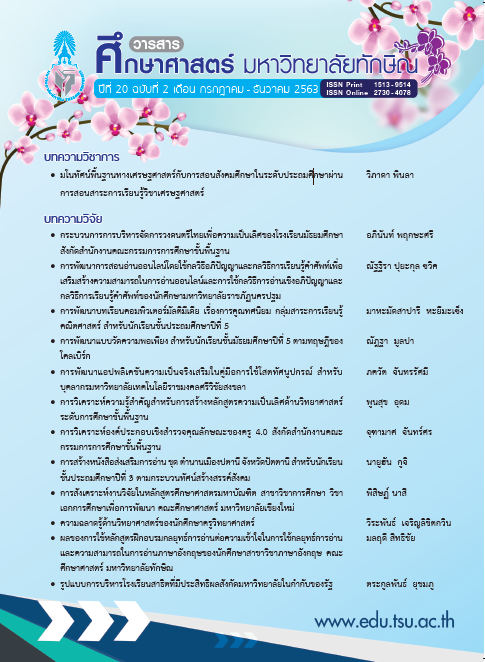ผลของการใช้หลักสูตรฝึกอบรมกลยุทธ์การอ่านต่อความเข้าใจในการใช้กลยุทธ์การอ่านและความสามารถในการอ่านภาษาอังกฤษของนักศึกษาสาขาวิชาภาษาอังกฤษ คณะศึกษาศาสตร์ มหาวิทยาลัยทักษิณ
Main Article Content
บทคัดย่อ
การวิจัยนี้มีวัตถุประสงค์เพื่อ 1) ศึกษาความรู้และความจำเป็นของทักษะการอ่าน การใช้และความจำเป็นของกลยุทธ์การอ่าน และความต้องการในการฝึกอบรมกลยุทธ์การอ่าน ของนักศึกษาสาขาวิชาภาษาอังกฤษ คณะศึกษาศาสตร์ มหาวิทยาลัยทักษิณ 2) พัฒนาหลักสูตรฝึกอบรมกลยุทธ์การอ่านให้มีประสิทธิภาพตามเกณฑ์ 75/75 และ 3) ประเมินประสิทธิผลของหลักสูตรฝึกอบรมในประเด็นความสามารถในการอ่าน ความเข้าใจในการใช้กลยุทธ์และขนาดของผล และความคิดเห็นของนักศึกษาต่อหลักสูตรฝึกอบรม กลุ่มตัวอย่าง ได้แก่ นักศึกษาสาขาวิชาภาษาอังกฤษ คณะศึกษาศาสตร์ มหาวิทยาลัยทักษิณ จำนวน 29 คน โดยวิธีการเลือกแบบเจาะจง เครื่องมือที่ใช้ในการวิจัย ได้แก่ แบบสอบถามความต้องการ หลักสูตรฝึกอบรม แบบทดสอบการอ่าน แบบประเมินตนเองด้านความเข้าใจในการใช้กลยุทธ์ แบบสอบถามความคิดเห็นต่อหลักสูตรฝึกอบรม และแบบสัมภาษณ์แบบกึ่งโครงสร้าง วิเคราะห์ข้อมูลโดยใช้สถิติพื้นฐาน ได้แก่ ค่าเฉลี่ย ค่าเบี่ยงเบนมาตรฐาน ค่าขนาดของผล และค่าทดสอบ t แบบไม่อิสระต่อกัน ผลการวิจัยพบว่า 1) นักศึกษามีความรู้ด้านทักษะการอ่านและการใช้กลยุทธ์ในระดับปานกลางแต่มีความจำเป็นต้องใช้ในระดับมาก 2) หลักสูตรฝึกอบรมที่พัฒนาขึ้นมีประสิทธิภาพเท่ากับ 79.94/77.76 สูงกว่าเกณฑ์ที่กำหนดไว้ 3) นักศึกษามีความสามารถในการอ่านภาษาอังกฤษและมีความเข้าใจในการใช้กลยุทธ์หลังฝึกอบรมสูงกว่าก่อนฝึกอบรมอย่างมีนัยสำคัญทางสถิติที่ระดับ .05 และมีขนาดผลที่ใหญ่มาก และนักศึกษามีความพึงพอใจต่อหลักสูตรฝึกอบรมโดยรวมในระดับมากในประเด็นการเพิ่มความเข้าใจในการใช้กลยุทธ์การอ่าน การพัฒนาความสามารถในการอ่าน และการจัดลำดับเนื้อหาและขั้นตอนการสอนที่เหมาะสม อย่างไรก็ตาม นักศึกษาระบุความพึงพอใจต่อกระบวนการเรียนการสอนที่เน้นการสอนกลยุทธ์แบบชัดเจนน้อยที่สุดเมื่อเปรียบเทียบกับด้านอื่น ๆ
Article Details
ในกรณีที่กองบรรณาธิการ หรือผู้เชี่ยวชาญ ซึ่งได้รับเชิญให้เป็นผู้ตรวจบทความวิจัย หรือ บทความทางวิชาการมีความเห็นว่าควรแก้ไขความบกพร่อง ทางกองบรรณาธิการจะส่งต้นฉบับให้ ผู้เขียนพิจารณาจัดการแก้ไขให้เหมาะสมก่อนที่จะลงพิมพ์ ทั้งนี้ กองบรรณาธิการจะยึดถือความคิด เห็นของผู้เชี่ยวชาญเป็นเกณฑ์
เอกสารอ้างอิง
Adunyritigun, D. (2002). An investigation of factors affecting English language reading success: A case study of an EFL college readers. Thammasat Review, 7(1), 244-271.
Anderson, N. (1999). Exploring second language reading: Issues and strategies. Boston: Heinle & Heinle.
Brahmawong, C. (2013). Developmental testing of media and instructional package. Silpakorn Educational Research Journal, 5(1), 7-20.
Brien, E. (2012). Teaching primary English. London: SAGE Publications Ltd.
Brown, H.D. (2000). Principles of language learning and teaching. New York: Pearson Education.
Carder, S.M. (2011). The effects of reading comprehension strategies on achievement for English Learners (ELs). (Doctoral dissertation). California State University. USA.
Chewarussamee, R. (2019). Development of a business English reading cooperative learning model to enhance reading comprehension, critical reading skills and business ethnic awareness for undergraduate students of management science, Silpakorn University. (Doctoral dissertation). Silpakorn University. Nakhon Pathom. [in Thai]
Cohen, A.D. (1988). Statistical power analysis for the behavioral sciences. (2nd ed.). Hillsdale, J: Lawrence Earlbaum Associates.
Graham, L., & Bellert, A. (2004). Difficulties in reading comprehension for students with learning difficulties, quoted in Wong, B. (ed.) Learning about learning disabilities. Elsevier Academic, 1, 251-279.
Graves, K. (2000). Designing language courses. London: Heinle & Heinle Publishers a Devision of Thomson Learning.
Hasan, S. W. (2015). The effect of teaching reading comprehension strategies on Iraqi EFL College students’ performance in reading comprehension. Journal of Babylon University, 23(2), 544-561.
Khaokaew, B. (2012). An investigation of explicit strategy instruction on EFL reading undergraduate English majors in Thailand. (Doctoral dissertation). University of Bedfordshire. England.
Kim, S.S. (2013). The impact of transactional strategies instruction on the reading comprehension of a diverse group of second graders. (Doctoral dissertation). University of San Francisco. USA.
Lindsay, C., & Knight, P. (2006). Learning and teaching English: A course for teachers. Oxford: Oxford University Press.
Manset, W.G., & Nelson, J.M. (2005). Balanced, strategic reading instruction for upper elementary and middle school students with reading disabilities: A comparative study of two approaches. Learning Disability Quarterly, 28, 59-74.
Medina, S.L. (2012). Effects of strategy instruction in an EFL reading comprehension course: A case study. PROFILE, 14(1), 79-89.
Mejang, A. (2004). The development of an English reading strategy instruction model based on collaborative learning principles for enhancing reading learning outcomes of university students. (Doctoral dissertation). Chulalongkorn University. Bangkok.
Piyanukool, S. (2001). Effects of teaching reading through discussion of text structures. Retrieved April 20, 2018, from http://www.lib.uni.com/dissertations/fullcit/3073547.
Prasansaph, S. (2018). The development of instructional models of task-based and cooperative learning for English critical reading and communicative writing skills. (Doctoral dissertation). Silpakorn University. Nakhon Pathom. [in Thai]
Razi, S. (2014). Metacognitive reading strategy training of advanced level EFL learners in Turkey. The Reading Matrix, 14(2), 337-360.
Richards, J. C. (2001). Curriculum development in language teaching. Cambridge: Cambridge University Press.
Richard, J. (2013). Curriculum approaches in language teaching: Forward, central, and backward design. RELC Journal, 44(1), 5-33.
Salataci, R., & Akyel, A. 2002. Possible effects of strategy instruction on L1 and L2 reading. Reading in a Foreign Language, 14(1), 1-17.
Shirvan, M.E. (2016). Assessing and improving general English university students’ main sub-skills of reading comprehension: A case of University of Bojnord. Sino-US English Teaching, 13(4), 245-260.
Tanghirunwat, C. (2003). The reading difficulties faced by Thai engineers in telecommunication industry in reading English technical textbooks and manuals. (Master’s thesis). The University of Thai Chamber of Commerce. Bangkok.
Tantisattayanon, Y. (2012). Development of business English reading modules focused on business ethical issues to enhance critical reading skills and business ethical awareness for the students of Rajamangala University of Technology Rattanakosin. (Doctoral dissertation). Silpakorn University. Nakhon Pathom. [in Thai]
Wang, X. (2015). Effect of meta-cognitive strategy training on Chinese EFL learners’ reading competence. International Journal of English Linguistics, 5(1), 159-169.
Zhou, J., Jiang, Y., & Yao, Y. (2015). The investigation on critical thinking ability in EFL reading class. English Language Teaching, 8(1), 83-94.


